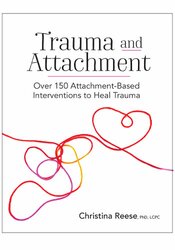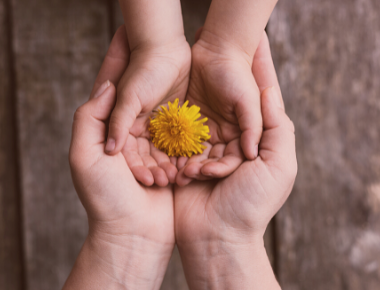Finding Healthy Attachment
Discover how attachment-based relationships provide a foundation for healing trauma

Christina Reese has dedicated her life’s work to helping those with trauma live healthier, happier, and more fulfilling lives. Her newest book, Trauma and Attachment, is designed to guide clients from a place of fear to healthy attachment.
Hear from Dr. Reese on the importance of incorporating attachment science when working with trauma:
Trauma is something that many experience during their lifetime.
Abuse and neglect are forms of trauma that we are all familiar with, but there are also attachment and medical traumas, natural disasters, and the act of witnessing violence that can lead to trauma responses. Trauma removes our feelings of safety and security. It leaves us with large feelings of fear, sadness, and anger. It changes the way that we think about people, places, and things associated with the traumatic experience. These can then become triggers to feelings of unsafety and insecurity. Even once actual safety has been restored it can be difficult to feel it. If trauma has happened within a relationship, then the relationships themselves can become places that do not feel safe and secure.
Understanding this allows us to also begin the healing journey after a trauma. Healing can only begin once feelings of safety and security have been restored. Often this happens within a relationship. Whether feeling safe happens in relationships with family and friends or occurs with a helping professional, the relationship provides the foundation for healing. Once we create a safe space physically, mentally, and emotionally, then the processing can begin and the relationship itself shows the way back to healthy attachment.
There has never been a better time to integrate attachment science into your practice! Over the last 18 months we have all been experiencing a medical trauma in COVID-19. Our feelings of safety and security have been removed as we have worried about our own safety and that of our friends and family. This has left us with large feelings of anxiety and even depression as we have struggled to remain connected without having personal contact. We have been compartmentalizing and containing our emotions as our focus has been on survival and adjusting to living in a pandemic. As life begins to shift back to a more normal routine, the need for trauma treatment and recovery tools will be in high demand.
Using attachment-based relationships as a foundation for healing provides survivors with validation and support that is instrumental in the healing journey.
Looking at the ways that trauma has impacted the brain and body, targeting interventions that bring healing to the thoughts, feelings, and the body can facilitate healing.
Understanding how a trauma response impacts the release of stress hormones and learning movement and breathing exercises can restore physiological regulation.
Using emotion regulation strategies including sensory and relational interventions can restore balance.
Changing our thoughts using positive self-talk and affirmations can restore healthy thinking.
Restoring safety and security, physiological regulation, emotional regulation, and healthy thinking bring recovery and healing to the person who has experienced a trauma.
Ready to see how attachment science can provide a foundation for healing? As previously mentioned, health-related anxiety is something we've all experienced this past year. See how the Controlling My Health exercise from my new book, Trauma and Attachment, can help you regain a sense of autonomy in the face of uncertainty. Click here to download this free exercise.
Hear from Dr. Reese on the importance of incorporating attachment science when working with trauma:
Trauma is something that many experience during their lifetime.
Abuse and neglect are forms of trauma that we are all familiar with, but there are also attachment and medical traumas, natural disasters, and the act of witnessing violence that can lead to trauma responses. Trauma removes our feelings of safety and security. It leaves us with large feelings of fear, sadness, and anger. It changes the way that we think about people, places, and things associated with the traumatic experience. These can then become triggers to feelings of unsafety and insecurity. Even once actual safety has been restored it can be difficult to feel it. If trauma has happened within a relationship, then the relationships themselves can become places that do not feel safe and secure.
Understanding this allows us to also begin the healing journey after a trauma. Healing can only begin once feelings of safety and security have been restored. Often this happens within a relationship. Whether feeling safe happens in relationships with family and friends or occurs with a helping professional, the relationship provides the foundation for healing. Once we create a safe space physically, mentally, and emotionally, then the processing can begin and the relationship itself shows the way back to healthy attachment.
There has never been a better time to integrate attachment science into your practice! Over the last 18 months we have all been experiencing a medical trauma in COVID-19. Our feelings of safety and security have been removed as we have worried about our own safety and that of our friends and family. This has left us with large feelings of anxiety and even depression as we have struggled to remain connected without having personal contact. We have been compartmentalizing and containing our emotions as our focus has been on survival and adjusting to living in a pandemic. As life begins to shift back to a more normal routine, the need for trauma treatment and recovery tools will be in high demand.
Using attachment-based relationships as a foundation for healing provides survivors with validation and support that is instrumental in the healing journey.
Looking at the ways that trauma has impacted the brain and body, targeting interventions that bring healing to the thoughts, feelings, and the body can facilitate healing.
Understanding how a trauma response impacts the release of stress hormones and learning movement and breathing exercises can restore physiological regulation.
Using emotion regulation strategies including sensory and relational interventions can restore balance.
Changing our thoughts using positive self-talk and affirmations can restore healthy thinking.
Restoring safety and security, physiological regulation, emotional regulation, and healthy thinking bring recovery and healing to the person who has experienced a trauma.
Ready to see how attachment science can provide a foundation for healing? As previously mentioned, health-related anxiety is something we've all experienced this past year. See how the Controlling My Health exercise from my new book, Trauma and Attachment, can help you regain a sense of autonomy in the face of uncertainty. Click here to download this free exercise.
Begin the Healing Journey

In this comprehensive yet accessible book, Dr. Reese provides an attachment framework for treating clients who have experienced a multitude of traumas, ranging from abuse and neglect to medical traumas, natural disasters, and exposure to violence. Through a variety of worksheets, exercises, and activities, this book provides clients with the tools they need to develop a foundation for healing so they can find feelings of safety and security within relationships again.
Inside, clinicians will find tools to help clients heal from the impact of:
Inside, clinicians will find tools to help clients heal from the impact of:
- Abuse by helping them establish safety and security within relationships.
- Neglect by teaching them to find their voice and express their needs.
- Medical trauma by helping them adjust to a new normal and better tolerate uncertainty.
- Natural disasters by using mindful grounding techniques to navigate sensory triggers and cultivate mind-body awareness.
- Witnessing violence by restoring clients’ sense of felt safety and helping clients identify what they can control to keep themselves safe.
Meet the Expert:
Christina Reese, PhD, LCPC, has been working with children impacted by trauma for over 15 years, and has recently completed training as a TBRI Practitioner. She helps children and their families impacted by a variety of traumas, providing both in home and in school therapy to these children. Over this time, Dr. Reese has partnered with schools in Baltimore County and Baltimore City to help teachers find interventions that get results in the classroom. A passionate advocate for children and their families, she has worked with children in court ordered drug treatment at the Anne Arundel County Circuit Court, as week as in residential treatment centers and in the community.
Dr. Reese, a recognized attachment and trauma professional, has created a comprehensive guide that explains attachment over a lifetime. her book, Attachment: 60 Trauma-Informed Assessment and Treatment Interventions Across the Lifespan (PESI, 2018), offers trauma-informed strategies to facilitate connection, rebuild trust and restore positive emotions.
Dr. Reese is a licensed clinical professional counselor in Maryland and Pennsylvania as well as a licensed clinical supervisor. She received her Master's Degree in community counseling from McDaniel College in Westminster, MD and her PhD in counselor education from George Washington University in Washington, D.C. Past work experiences include being director of a mental health clinic and the case manager of the Howard County Cold Weather Shelter, working with homeless individuals and families. additionally, Dr. Reese is very passionate about her work focusing on attachment and has extensive experience with adoptive families and children in foster care.
Learn more about their educational products, including upcoming live seminars, by clicking here.
Dr. Reese, a recognized attachment and trauma professional, has created a comprehensive guide that explains attachment over a lifetime. her book, Attachment: 60 Trauma-Informed Assessment and Treatment Interventions Across the Lifespan (PESI, 2018), offers trauma-informed strategies to facilitate connection, rebuild trust and restore positive emotions.
Dr. Reese is a licensed clinical professional counselor in Maryland and Pennsylvania as well as a licensed clinical supervisor. She received her Master's Degree in community counseling from McDaniel College in Westminster, MD and her PhD in counselor education from George Washington University in Washington, D.C. Past work experiences include being director of a mental health clinic and the case manager of the Howard County Cold Weather Shelter, working with homeless individuals and families. additionally, Dr. Reese is very passionate about her work focusing on attachment and has extensive experience with adoptive families and children in foster care.
Learn more about their educational products, including upcoming live seminars, by clicking here.



